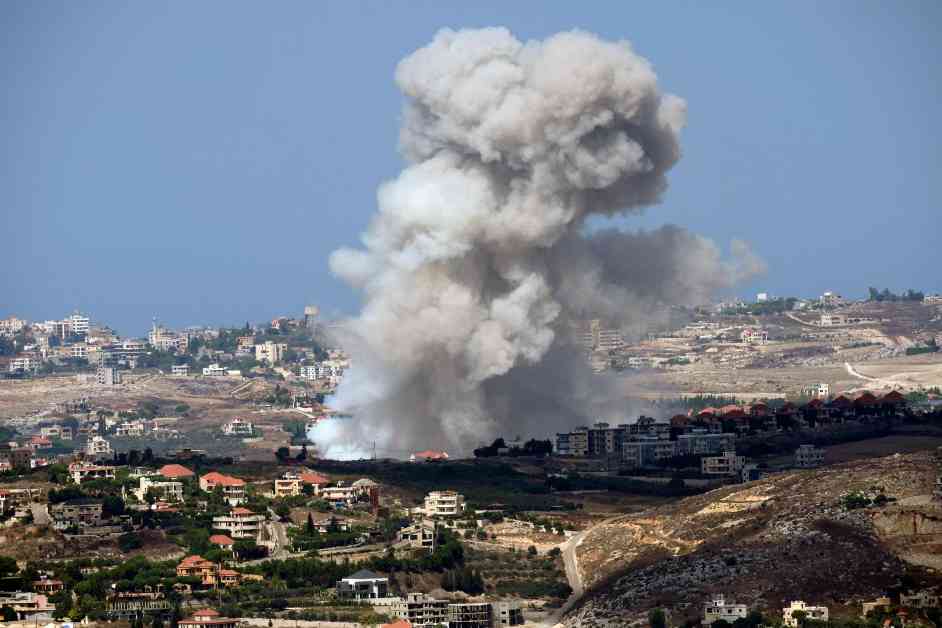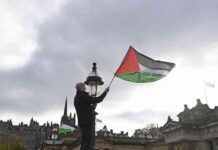AN Israeli air strike on north-east Lebanon has killed 11 people a day after the Lebanese militant group Hezbollah confirmed the death of multiple commanders, including long-time leader Hassan Nasrallah.
Lebanon’s state news agency said the attack early on Sunday on a village destroyed a home, killing all 11 people inside. Six of the bodies were recovered from under the rubble, and the search continues for the remaining five in the village of al-Ain, the National News Agency said.
The Israeli army says it is carrying out attacks on Hezbollah targets in Lebanon. More than 700 people have been killed in Lebanon since September 23 when Israel intensified its air strikes around the country, forcing tens of thousands to flee their homes in south Lebanon, the eastern Bekaa Valley, and Beirut’s southern suburb known as Dahiyeh.
The number of those displaced has more than doubled and now stands at more than 211,000, according to the United Nations. Israeli Prime Minister Benjamin Netanyahu said targeting Hezbollah leader Nasrallah was “an essential condition to achieving the goals we set”.
Hezbollah confirmed on Saturday that Nasrallah, one of its founding members who has been linked by Israel to attacks on Israeli and Jewish targets, had been killed in an air strike in southern Beirut. The Israeli military said it carried out a precise air strike on Friday while Hezbollah leaders were meeting at their headquarters in Dahiyeh.
In his first public remarks since the killing, Netanyahu said: “He wasn’t another terrorist. He was the terrorist.” He said Nasrallah’s killing would help bring displaced Israelis back to their homes in the north and would pressure Hamas to free Israeli hostages held in Gaza.
But with the threat of retaliation high, he said the coming days will bring “significant challenges” and warned Iran against trying to strike. “There is no place in Iran or in the Middle East that Israel’s long arm cannot reach,” he said. “Today you know how much that is true.”
Ali Karki, the commander of Hezbollah’s Southern Front, and other commanders were also killed, the Israeli military said. A statement from Hezbollah said Nasrallah – who led the group for more than three decades – “has joined his fellow martyrs”. The group vowed to “continue the holy war against the enemy and in support of Palestine”.
### Impact on Civilians and Humanitarian Crisis
The ongoing conflict between Israel and Hezbollah has had devastating consequences for civilians in Lebanon. The air strikes have forced hundreds of thousands of people to flee their homes, resulting in a humanitarian crisis in the region. The destruction of homes, infrastructure, and livelihoods has left many families without basic necessities and in urgent need of assistance.
The United Nations and other international organizations have been working to provide aid to those affected by the violence. However, the scale of the crisis and the ongoing hostilities make it difficult to reach all those in need. Humanitarian workers face challenges in delivering aid safely and efficiently, as the conflict continues to escalate.
The international community has called for an immediate ceasefire to allow for the delivery of humanitarian aid and to protect civilians caught in the crossfire. The targeting of civilian areas and infrastructure is a violation of international law and must be condemned by all parties involved in the conflict. The protection of civilians must be a top priority in any resolution to the crisis.
### Regional and Global Implications
The escalating tensions between Israel and Hezbollah have raised concerns about the stability of the region and the potential for further violence. The involvement of other actors, such as Iran and Hamas, adds another layer of complexity to the conflict and increases the risk of a wider regional confrontation.
The international community must step in to mediate a peaceful resolution to the conflict and prevent further loss of life. Diplomatic efforts are needed to de-escalate the situation and address the root causes of the conflict. The ongoing violence only serves to perpetuate a cycle of retaliation and revenge, leading to more suffering and destruction.
The impact of the conflict extends beyond the borders of Lebanon and Israel, affecting neighboring countries and the broader Middle East region. The instability and insecurity created by the conflict have far-reaching consequences that could destabilize the entire region. It is crucial for all parties to prioritize dialogue and negotiation to find a sustainable and lasting solution to the crisis.
### Calls for Justice and Accountability
The targeting of civilians and the killing of innocent people in the conflict between Israel and Hezbollah must be investigated and those responsible held accountable for their actions. The violation of international humanitarian law and human rights norms cannot go unpunished, as it only perpetuates a culture of impunity and injustice.
Both Israel and Hezbollah must adhere to the principles of international law and respect the rights of civilians in conflict zones. The protection of non-combatants and civilian infrastructure is a fundamental obligation that all parties must uphold. Any violations of these principles must be thoroughly investigated and addressed through legal mechanisms.
The international community, including the United Nations and other organizations, must support efforts to ensure justice and accountability for the victims of the conflict. The voices of those affected by the violence must be heard, and their rights to truth, justice, and reparations must be upheld. Only through a commitment to justice and accountability can the cycle of violence and impunity be broken.
In conclusion, the ongoing conflict between Israel and Hezbollah has had devastating consequences for civilians in Lebanon and the broader region. The targeting of civilian areas and infrastructure is a violation of international law and must be condemned. The international community must prioritize the protection of civilians and support efforts to find a peaceful resolution to the conflict. Justice and accountability for the victims of the violence are essential to building a sustainable and just peace in the region.












